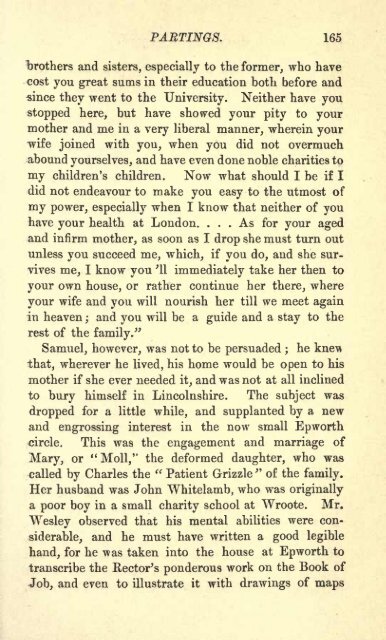Susanna Wesley
This is the story of Susanna Wesley, 1669-1742 Mother of Charles and John Wesley, who were founders of the Methodist Church. Susanna and her husband, Samuel, had nineteen children, ten of whom survived to adulthood. Her son Charles became a well-known hymn writer and her son John became the found of Methodism. Susanna was brought up in a Puritan home as the youngest of twenty-five children. As a teenager, she became a member of the Church of England. She became the wife of a chronically debt-ridden parish rector in an English village. She said, "I have had a large experience of what the world calls adverse fortune." Nonetheless, Susanna managed to pass down to her children Christian principles that stayed with them.
This is the story of Susanna Wesley, 1669-1742 Mother of Charles and John Wesley, who were founders of the Methodist Church. Susanna and her husband, Samuel, had nineteen children, ten of whom survived to adulthood. Her son Charles became a well-known hymn writer and her son John became the found of Methodism.
Susanna was brought up in a Puritan home as the youngest of twenty-five children. As a teenager, she became a member of the Church of England. She became the wife of a chronically debt-ridden parish rector in an English village. She said, "I have had a large experience of what the world calls adverse fortune." Nonetheless, Susanna managed to pass down to her children Christian principles that stayed with them.
Create successful ePaper yourself
Turn your PDF publications into a flip-book with our unique Google optimized e-Paper software.
PARTINGS. 165<br />
brothers and sisters, especially to the former, who have<br />
cost you great sums in their education both before and<br />
since they went to the University. Neither have you<br />
stopped here, but have showed your pity to your<br />
mother and me in a very liberal manner, wherein your<br />
wife joined with you, when you did not overmuch<br />
abound yourselves, and have even done noble charities to<br />
my<br />
children's children. Now what should I be if I<br />
did not endeavour to make you easy to the utmost of<br />
my power, especially when I know that neither of you<br />
have your health at London. ... As for your aged<br />
and infirm mother, as soon as I drop she must turn out<br />
unless you succeed me, which, if you do, and she survives<br />
me, I know you<br />
'11<br />
immediately take her then to<br />
your own house, or rather continue her there, where<br />
your wife and you will nourish her till we meet again<br />
in heaven and ; you will be a guide and a stay to the<br />
rest of the family."<br />
Samuel, however, was not to be persuaded ;<br />
he kne\*<br />
that, wherever he lived, his home would be open to his<br />
mother if she ever needed it, and was not at all inclined<br />
to bury himself in Lincolnshire. The subject was<br />
dropped for a little while, and supplanted by a new<br />
and engrossing interest in the now small Epworth<br />
circle. This was the engagement and marriage of<br />
Mary, or " Moll," the deformed daughter, who was<br />
called<br />
' '<br />
by Charles the Patient Grizzle " of the family.<br />
Her husband was John Whitelamb, who was originally<br />
a poor boy in a small charity school at Wroote. Mr.<br />
<strong>Wesley</strong> observed that his mental abilities were considerable,<br />
and he must have written a good legible<br />
hand, for he was taken into the house at Epworth to<br />
transcribe the Rector's ponderous work on the Book of<br />
Job, and even to illustrate it with drawings of maps

















